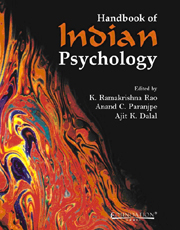Book contents
- Frontmatter
- Contents
- Contributing Authors
- Preface
- 01 Prologue: Introducing Indian Psychology
- 02 Indian Thought and Tradition: A Psychohistorical Perspective
- PART I SYSTEMS AND SCHOOLS
- PART II TOPICS AND THEMES
- PART III APPLICATIONS AND IMPLICATIONS
- Pronunciation and Transliteration of Sanskrit Alphabet
- Glossary
- Index
02 - Indian Thought and Tradition: A Psychohistorical Perspective
Published online by Cambridge University Press: 26 October 2011
- Frontmatter
- Contents
- Contributing Authors
- Preface
- 01 Prologue: Introducing Indian Psychology
- 02 Indian Thought and Tradition: A Psychohistorical Perspective
- PART I SYSTEMS AND SCHOOLS
- PART II TOPICS AND THEMES
- PART III APPLICATIONS AND IMPLICATIONS
- Pronunciation and Transliteration of Sanskrit Alphabet
- Glossary
- Index
Summary
Psychology as a scientific discipline has a short history of hundred and odd years but it has a long past as a subject of human inquiry. In all cultures we find some psychological concepts and theories employed by people. Different labels like naïve psychology, commonsense psychology, ethnopsychology, everyday psychology, and the psychology of the populace are used to refer to them (Thomas, 2001). The agenda of modern scientific psychology is to move from these naïve and commonsense notions towards a universally applicable set of concepts, principles and theories. In the jargon of cross-cultural psychology, the attempt is to move from “emic” to “etic” or from “culture specific” to “culture free” knowledge. Unfortunately, however, the scientific psychology that emerged in the West has itself turned out to be another version of emic or culture-specific or ethnopsychology, being heavily influenced by the cultural values and outlook of the Western world (Tart, 1975a; Kim and Berry, 1993; Much, 1995). Its claim of universality is being viewed as “imposed etic” rather than “derived etic” (Kim and Berry, 1993). Modern scientific psychology fails to account for all the variations of human behaviour across cultures and it is also limited in its scope and leaves out all those aspects of human nature and experience that do not fit the framework of scientific approach. It is in this scenario that psychologists all over the world have felt the need to examine the “indigenous psychologies” (Kim and Berry, 1993; Kim and Park, 2005) for their contemporary relevance to account for behaviour, locally and globally, wherever they have the potential utility.
- Type
- Chapter
- Information
- Handbook of Indian Psychology , pp. 19 - 52Publisher: Foundation BooksPrint publication year: 2008
- 8
- Cited by

